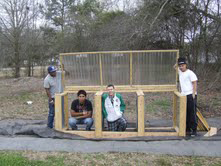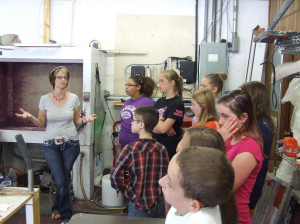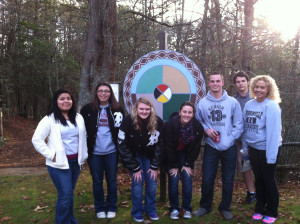Youth and Economic Development
go.ncsu.edu/readext?255759
en Español / em Português
El inglés es el idioma de control de esta página. En la medida en que haya algún conflicto entre la traducción al inglés y la traducción, el inglés prevalece.
Al hacer clic en el enlace de traducción se activa un servicio de traducción gratuito para convertir la página al español. Al igual que con cualquier traducción por Internet, la conversión no es sensible al contexto y puede que no traduzca el texto en su significado original. NC State Extension no garantiza la exactitud del texto traducido. Por favor, tenga en cuenta que algunas aplicaciones y/o servicios pueden no funcionar como se espera cuando se traducen.
Português
Inglês é o idioma de controle desta página. Na medida que haja algum conflito entre o texto original em Inglês e a tradução, o Inglês prevalece.
Ao clicar no link de tradução, um serviço gratuito de tradução será ativado para converter a página para o Português. Como em qualquer tradução pela internet, a conversão não é sensivel ao contexto e pode não ocorrer a tradução para o significado orginal. O serviço de Extensão da Carolina do Norte (NC State Extension) não garante a exatidão do texto traduzido. Por favor, observe que algumas funções ou serviços podem não funcionar como esperado após a tradução.
English
English is the controlling language of this page. To the extent there is any conflict between the English text and the translation, English controls.
Clicking on the translation link activates a free translation service to convert the page to Spanish. As with any Internet translation, the conversion is not context-sensitive and may not translate the text to its original meaning. NC State Extension does not guarantee the accuracy of the translated text. Please note that some applications and/or services may not function as expected when translated.
Collapse ▲Person reporting: Sharon English Location: Scotland County Updated 2014-03-05
Scotland County youth experiencing court involvement, school failure, out of home placement and limited resources are considered an exceptionally high-risk group. Specifically, youth with these risk factors have high rates of adult incarceration, substance abuse, early mortality, school dropout, chronic unemployment and poor health outcomes.

Growing Change in Scotland County
In fall of 2011, Scotland County Cooperative Extension met with a licensed mental health therapist who had developed a clinical pilot program that combined intensive therapy, gardening, and service learning. The target audience was a group of ten male youths, ages 14 – 17, considered Dispositional II, one step away from incarceration, and who had been placed out-of-home, out-of- school and on probation.
This unique partnership of N.C. Cooperative Extension, NC A&T State University, NC State University, Department of Public Safety, UNC-Pembroke, local agencies, citizens and the faith community is supporting the start-up non-profit, growingchange.org, whose goal is to transform small closed rural prisons into sustainable farms and educational centers. One such former prison is located in Scotland County, in the town of Wagram.
The primary goal of growingchange.org is to “flip” former prison sites, beginning with the former Wagram prison site, into working farms that provide educational sites for youth to complete court-mandated community service hours and to divert youth from court who are facing problems in school or the community.
Additionally, veterans and their families will benefit from hands-on residential internships while completing their degree work. Combining court diversions for youth, residential internships for veterans, school modules, wellness programs, summer camps for underserved youth and recreational trails through 76 acres of agroforestry land, the Wagram site would serve hundreds annually. Also, neighboring UNC-Pembroke plans to field some of its’ sustainable agriculture tract at the former prison site. In the fifth year, supported by a working model, growingchange.org plans to send out additional ‘Reclamation Teams’ to help other communities “flip their prison”.
Initial programing efforts with growingchange.org began in 2012 and included the development of a CSA (Community Supported Agriculture) program that provided fresh vegetables to nine families identified as at- risk for food insecurity. The youth planted, harvested and donated food from the Wagram Community Garden (an NC A&T State University CYFAR-Children Youth and Families At Risk grant sponsored garden), a church community garden and a high tunnel greenhouse at the local high school. The youth surpassed their initial goal of harvesting their combined weight in produce. A total of 1,826 pounds of produce (including watermelon, tomatoes, cantaloupe, squash, zucchini, cucumbers, eggplant, peppers, and herbs) was delivered to the families, with overflow donated to the local food bank and domestic violence shelter. The youth continued to utilize the three sites in 2013 to harvest and donate food. Additionally, the youth added a small flower production in 2012 and included flowers with the food donations. However, in 2013 their flower harvest was enjoyed by our local deer population.
Composting was added to both the Wagram and Laurinburg Community gardens. The building of the three-bin compost systems for the gardens required the youth to engage in the selection, planning and execution of a design. For the majority of the youth, it was the first time they had used tools to build anything. The youth have volunteered to assist with the ongoing maintenance of the bins and gardener compost training at both sites.
Beekeeping was another area of interest to the growingchange.org youth. After identifying a local beekeeper and attending his workshop on managing an apiary program, the youth decided to approach the Wagram Community Garden members on incorporating bees. Following approval from the gardeners, the youth group selected a member, who has a great respect for all animals and insects, to be responsible for the care and maintenance of the hive. This young man organized his team in constructing a bee box for the hive. The bees were incorporated into the Wagram Community Garden in the fall and the youth and volunteer beekeeper are feeding the hive through the winter.
The youth visited NC A&T State University for a guided campus and farm tour. This was an important day. These young men do not have people in their lives that attended college, and can guide them in the resume building and college application process. Care was taken by NC A&T State University staff to put people in place to encourage and motivate these young men throughout the day. Following this visit, the young men began to realize that with focused effort, college could become a reality in their future. The youth returned to NC A&T State University in the spring of 2013 to lead a panel discussion on youth entrepreneurship at the Grassroots Leadership Conference. During the panel discussion, the team shared their individual stories and showcased their work in the county. Two years ago, these youth would not have been comfortable (or invited) to participate in an event like this. However, through their involvement in the Cooperative Extension programs, trainings and leadership development opportunities, their confidence and self-efficacy has blossomed. One powerful moment came when one of the young men shared that his family name had a negative reputation in the county. He was always told he would follow in the footsteps of his family members. He shared that he was most proud of the fact that through his continued hard work and focused efforts, he will flip his future and prove many people wrong.
The youth team has visited NC State University on several occasions, one of which was to attend a vermi-culture workshop leading to the group producing their own vermi-compost. One of the youth members established a personal vermi-culture business, for which he was honored as the youngest panelist at the Rural Center of North Carolina’s symposium on youth entrepreneurism. Another educational experience was provided through a weeklong NC State University horticulture camp. This camp provided the youth a broad hands-on opportunity to explore horticulture by learning about: fruit and vegetable breeding practices, growing of woody ornamentals, cut flowers, and sustainable production practice and plant production. Additionally, the camp included visits to local horticulture businesses, which provided an opportunity for the youth to have first hand exposure to career possibilities. The training not only provided the youth with tools to assist them in their gardening efforts, but with the majority of them having traveled no more than a two county distance, the camp allowed them to experience life on a major university campus.
The group has also learned the importance of community service and the rewards of making a difference in the lives of others. The team recently collaborated with the faith-based Partners In Health and Wholeness to present an organic gardening workshop to sixty church youth from a six county region. The youth have seen first-hand elderly gardeners moved to tears when they offered to assist them in their garden plots. They have provided landscaping improvements for both community gardens and prepared the garden beds for a local elementary school. Additionally, living the value of “re-use”, they worked with school leadership to plant and manage the high school greenhouse to prevent it from lying dormant during the summer months. This is a crucial moment for these youth to be in such positions that community members actively praise them. Many of these youth had never been in our local paper, nor recognized for any accomplishments. These positive experiences and opportunities have become a clinical tool to help parents reconnect to pride in their sons.
These young men were headed to prison but “flipped” this future to become today’s leaders. Now they are the youth leadership in the larger initiative to flip a small closed prison in Wagram, North Carolina. On December 9th, 2013 on the 14th floor of Raleigh’s Archdale building, two of the growingchange.org youth members shared the plan to convert the Wagram prison into a sustainable farm and educational center to Department of Public Safety’s (DPS) Executive Leadership Team. DPS approved the plan and testing funded by a $200,000 Environmental Protection Agency (EPA) grant will begin in March. The Wagram prison site flip will be a national first per EPA.
In August, the NC State University School of Design students will begin to develop a site model. Youth once gang recruited and who were on probation are now leading DPS in developing a nationally innovative and replicable model. This team is “flipping” prominent county environmental hazards into one of the county’s most productive environmental assets.
“Annual costs for involvement by the Juvenile Youth Development Center (YDC) is $102,000 per youth. Initially the nine youth were one step away from a YDC commitment. However, with all nine youth avoiding incarceration, the state realized a potential $918,000 in annual savings”.
(Currently there are two decorated war veterans that are part of the coalition to flip the prison. However, when the sustainable farm and agriculture center is completed, it will be open to all veterans, both combat and non-combat, who are pursuing their college education.)
Person Reporting: Spring Williams -Byrd Location: Burke Date: 2013-06-29
Burke County identified the need to promote small business and encourage entrepreneurship throughout the county. Cooperative Extension served on the Leadership Council with Burke County Chamber of Commerce, Western Piedmont Community College, and Burke County Public Schools to coordinate, implement, and evaluate seminars, network sessions, and opportunities for business owners and citizens.

Burke County Entrepreneurs and Business Owners meet quarterly and hold training sessions with local youth.
A Young Entrepreneurship Day was held with more than 150 youth participating. A Burke Entrepreneurs and Business Owners (BeBo) Forum was held on Human Resources and Networking with 60+ business owners attending. These programs have increased awareness and have had a positive social impact for current business leaders. In addition, participants have reported enhanced and improved business practices leading to higher economic value. Youth participating also reported an increase in knowledge and skills to becoming entrepreneurs.
Update: Promotion of Entrepreneurship in adults and youth continues to be a focus for the county. The Burke Entrepreneurs and Business Owners continue to meet quarterly and hold training sessions. Most recently this group hosted Meridith Elliott Powell an international speaker, coach, strategist, and author for a program on “The Business of Networking.” In addition, youth not only participated in the Young Entrepreneurship Day , but many attended the week-long Entrepreneurship Day camp and visited local businesses.
Person Reporting: Eve Rogers Location: Graham Date: 2013-07-03

Youth and Young Adults are very interested in community development and have great ideas to contribute to local planning.
Teen leadership is a critical component to developing future leaders. The Graham County 4-H Advisory Council identified teen leadership as a major objective to work on. As a direct result, Graham County Extension partnered with the NC Rural Center and received a grant for $20,000 to use toward leadership development.
A new youth council was created called Graham United Way Youth Council. The youth council met twice a month, participated in community meetings, and toured several local cultural sites. The efforts of the youth council created an opportunity for them to help with the funding of a local park. The youth council partnered with Graham County Economic Development and Parks and Recreation with the creation of Graham Counties first public Adult Park.
The youth voted to fund a climbing wall, and provide picnic tables and grills. The goal was

The youth council partnered with Graham County Economic Development and Parks and Recreation with the creation of Graham Counties first public Adult Park.
to create more safe recreation opportunities for local youth. The results of project include $5,000 going towards local youth leadership development, $15,000 going towards the creation of a park, and leadership development skills learned included civic engagement, public speaking skills, as well as grant writing and planning. Youth that participated in the youth council have a 100% high school graduation rate and a 100% college acceptance rate.
Lessons Learned: There are a lot of things going on in Graham County that the youth didn’t know about and it took time to get caught up on the current project plans.
Youth and Young Adults are very interested in community development and have great ideas to contribute to local planning. Meetings, planning, and decision making take a lot of time and commitment, but can have huge rewards. We had many partners throughout the project and without community support we never would have succeeded. Giving control to the young adults and youth over their project was essential!
Person Reporting: Reba Green-Holley Location: Gates Date: 2013-07-01
Every year rural counties lose their most precious resource to a more urban environment once they graduate from high school. The NC Rural Center study indicated that Gates County is one such county. As a result the Gates County Extension Director was able to obtain a $20,000 grant from the NC Rural Center to engage youth in a community development project. An action team consisting of 16 youth and adults was created.
They participated in leadership development workshops utilizing Community Voices curriculum while learning about the county’s needs and resources. The action team implemented a project with three components: Youth Explosion Conference which reach 56 youth with topics covering youth issues (14 facilitators, 8 agencies, guest speaker and entertainment); Day of Caring in which 26 youth and 5 adult volunteers performed 7 service learning projects collaborating with 5 agencies; and the purchase of historic signage for the Reid’s Grove Rosenwald School which was put on the national registry two years ago.
As a result of participating in the program 100 percent of the youth gained a better understanding of Gates County; increased their leadership skills; and became more engaged in the community.
Person Reporting: Linda Gore Location: Moore Date: 2012-12-20
Research indicates a growing need for leadership training to ensure young people are prepared for the work force, political and civic life. The Moore County Government Leadership Academy 2012 is a program that places High School and College students in internships throughout county Government. The Leadership Academy is an initiative sponsored by Moore County Government and Moore County Cooperative Extension 4-H.

2013 interns, NC State Representative Jamie Boles, front right; Ed Dennision, Moore County School Board member on the left, and NC Representative Allen McNeil.
Since its inception in 2010, the program has continued to improve and become very popular in the Moore County community. The program gives students a unique insight into the workplace in a fun and interactive way to see the inner workings of local government. Participants gained work experience, developed leadership skills, learned how government affects them, learned how decisions are made in the county and beyond, met local government officials, state legislators, and staff. They also learned how they can become involved in the process. Interns volunteered a total of 240 hours valued at $5,160. They were also required to complete a community service project of their choice within their community.
One of the goals of the Leadership Academy is to build character and community awareness in the participants of the program. This program has taught many young people leadership skills that will benefit them throughout their life. As a result of the internship program, 90 percent of participants stated they learned that the county provided services they were not aware of and 60 percent stated they would consider a career in county government.
Lesson Learned: The Moore County Government Internship Academy, allowed high school students an opportunity to build leadership skills, self-confidence and learn first-hand how county and state government operates.
A civic education component allowed young people to gain insight into the workplace, participate in simulations, and hands-on-activities that gave them a chance to learn the process of becoming a government employee or elected official. Through panel discussions and interactions with local and state representatives, senators and school board members, these young people voiced their opinions and shared ideas on issues they felt were important to them and their communities.
The community service component of the program revealed that young people are increasingly seeking out opportunities to improve the world by volunteering their service to projects they consider to be important. The community gains a generation of young people who care about where they live and are willing to help make a difference.
Major reasons cited by teens for participating in the internship program:
- Ability to gain important job skills and experience, while exploring career options.
- Expand their professional and social networks.
- Opportunities for future employment within county government.
As a result of the Internship Program, participants 17 years old were hired by the Moore County Board of Elections to work in the last Presidential Election. This was the first time in the history of Moore County that 17 year olds were allowed to work the polls.
Person Reporting: Heather Gordon Location: Jackson Date: 2012-12-28
In many cases education is most impactful when it is experiential. The members of the Give Change Get Change (GC2) Committee of the Jackson County Youth Leadership Council are learning to give their time, talent, and treasure to our community in a very real way. Through a partnership with Leading to Change and the NC Youth Giving Network these teen leaders are learning about philanthropy.
Each month a facilitator leads them through teambuilding exercises and educational programs about grant funding. During the process the Council members create a request for proposals, market what grant funds are available, seek applicants, review the applications, and award money for youth led projects, and implement an event to celebrate the accomplishments of grant recipients.
In 2012 the GC2 committee awarded $1,900 for youth-led projects in Jackson County. One of these projects, a Boy Scout Eagle Scout project to construct a permanent handicap ramp at a local church, will make a difference for many years.
Person Reporting: Linda Gore Location: Moore Date: 2012-12-20
Young people of today are the entrepreneurs of the future. They like the idea of owning their own business, and being in charge, that often go along with business ownership. Futurist John Naisbitt (1994) predicts that as structured employment opportunities decline, entrepreneurial skills will become necessary for workers to compete in the workforce. Problem is, they often don’t know what it takes to become an entrepreneur.

Two middle school students at the 21st Century Learning Centers, after school program, started businesses.
After completing the 4-H Curriculum, “Reading Makes Cents”, and investigating different ways to make money, saving, and investing, two middle school students at the 21st Century Learning Centers, after school program, started businesses. These girls enrolled in a jewelry making class, worked on a business plan, and received start up monies from the Center. The girls sold $106 worth of jewelry in three weeks. After deducting their initial investment, $30 was invested back into their business to buy additional supplies, $6 was donated to church, $20 was put into savings, and $10.00 was fun money.
The father of one of the girls assisted in setting up a computer chart to track revenues and expenses. In addition, 12 other girls who completed the program are starting a jewelry making business. Kindergarten and first graders are in the process of growing tomato plants to sell, and boys in the program are learning car detailing in order to start businesses. These students discovered what entrepreneurship is, how to find and make their own business opportunities, and the rewards that are possible from owning a business.
Person Reporting: Doug Clement Location: Cherokee Date: 2012-12-28
A $6,000 sustainable agriculture grant was received to begin a Poultry Chain in Cherokee and Clay Counties. 12 youth received instructions, equipment, and 25 baby chicks for the youth project. The youth learned proper care and management of the birds and provided 6 chickens to the project to be sold at auction. The money will be utilized to continue the poultry project in 2013.
Person Reporting: Donna Rewalt Location: Durham Date: 2012-06-29
Our Kids Voting Program created a candidate guide and hosted a candidate forum for school board and county commissioner candidates. These youth-led initiatives brought young people together to write and submit questions to candidates for a candidate guide that was shared with youth and adult voters. The Kids Voting guide is considered one of the best candidate guides available. The youth also led the round table candidate forum and created and asked questions of each candidate. Durham Extension Kids Voting Program Coordinator successfully organized and trained the young people and volunteers for these activities.
Person Reporting: David Fogarty Location: Gaston Date: 2013-01-23
In partnership with the Gaston County Schools and the Schiele Museum, Gaston County Cooperative Extension held the fourth annual Gaston Regional Science Fair. In 2012, 2200 youth participated in the Gaston Regional Science and Engineering Fair year-long school enrichment program; 425 direct competitors representing 208 projects and over 2400 8th grade youth participating in fair events and workshops. Participants gained presentation skills and skills in how to apply the scientific method. Over 80% of participants expressed a desire to pursue a STEM related career and increased confidence in applying scientific research concepts.


